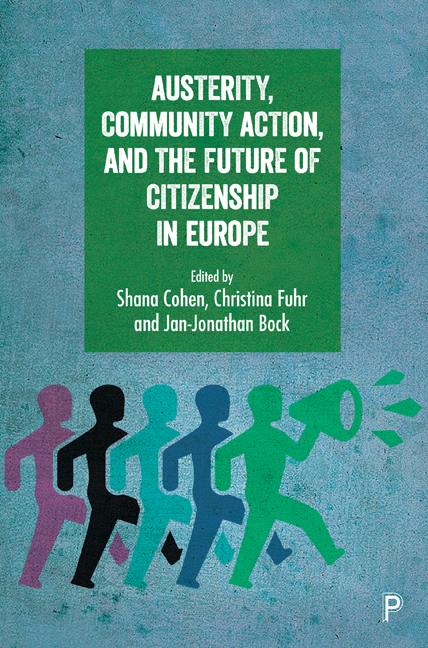Book contents
- Frontmatter
- Dedication
- Contents
- Acknowledgements
- Notes on contributors
- one Introduction: social activism, belonging and citizenship in a period of crisis
- Part I The social consequences of welfare policy
- Part II The practice of social good
- Part III Social change and neoliberalism
- Part IV Situating solidarity in perspective
- Index
Twelve - The new economy of poverty
Published online by Cambridge University Press: 05 April 2022
- Frontmatter
- Dedication
- Contents
- Acknowledgements
- Notes on contributors
- one Introduction: social activism, belonging and citizenship in a period of crisis
- Part I The social consequences of welfare policy
- Part II The practice of social good
- Part III Social change and neoliberalism
- Part IV Situating solidarity in perspective
- Index
Summary
There is no shortage of news coverage in Europe and abroad on scarcity, deprivation and austerity in wealthy countries. And there are lots of reports about life in a society of austerity, such as Great Britain (O’Hara, 2014; McKenzie, 2015) or Germany (Bude, 2008; Selke, 2008, 2013a). One can even assume that amid growing wealth, there are also established ‘poverty cultures’ within which affected people arrange themselves in order to preserve last shreds of dignity. For people without the necessary resources to fulfil the demands of an ideologised meritocracy (Distelhorst, 2014), the consequence is that ‘arranging oneself is possibly the only alternative in order to find a way of life, to some extent’ (Lutz, 2014, p 13). New ways into exclusion start in the middle of contemporary societies, long before they reach the trap of peripheral precarity.
Societal conditions under which poor people have to prove themselves as acting subjects are increasingly based on the anticipation of individual failure, framed in terms of general suspicion. The fact that complete segments of society are collectively stigmatised – for example, recipients of unemployment benefits are called Hartzers in Germany – indicates the reversed burden of proof of the representation of one's own social respectability. Social exhaustion emerges as a newly established semantic field that groups people as ‘worthy’ or ‘unworthy’ individuals. This semantic field leads to a pre-modern moralisation of poverty and neo-feudalistic forms of poverty reduction.
In this chapter, I discuss German foodbanks (Tafeln) as a prototypical example of such phenomena, which I call ‘economy of poverty’. In this economy, the main questions are: is a new culture of poverty subtly forming, based on the systematic and long-term presence of poverty? Does the emergence of new private actors, purportedly seeking to fight poverty, suggest that some people benefit financially from austerity? Are we witnessing the establishment of an economy of poverty that uses austerity to produce private profit? If this were so, it would at least explain why poverty is not being fought in a sustainable manner. In this chapter, I analyse whether certain services are systematically offered to the poor, and whether this supply is based on the existence of structural poverty. My central questions are: how is poverty becoming a business, and what is the central control mechanism in this economy of poverty?
- Type
- Chapter
- Information
- Austerity Community Action and the Future of Citizenship , pp. 197 - 216Publisher: Bristol University PressPrint publication year: 2017

